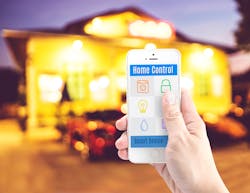Dan Goodman has a good idea. Ordinarily I don’t like to hear a pitch from a vendor that’s disguised as a seminar session, but this one was different. Goodman is an MIT electrical engineer who is the co-founder of a company called Building 36 Technologies. Back before the Great Recession, Goodman was the chief technology officer of an outfit called Radio Thermostat that developed the first communicating thermostat. That was around the same time that the iPhone was invented so there most likely was not an app for that yet.
I heard Goodman speak at the Service Nation Alliance meeting in Las Vegas and he has a solution that can help contractors break into the smart home market. My big beef with the smart home market is the confusion that surrounds it with Zigbee, Z Wave, Google’s Thread platform and Works With Nest, Apple’s HomeKit, Samsung’s Smart Things Hub and Amazon’s Echo. How does a contractor make sense of this all? How does a contractor avoid picking the Betamax of smart home systems?
The techies at CNET bought a 5,800-sq.ft. house outside of Louisville, Kentucky, and stuffed it with all of the smart and connected products they could find. In a story published this past spring, “Secrets of the CNET Smart Home,” CNET writer Rich Brown noted, “Different product families don’t always work together.” The CNET crew is pretty savvy but a smart home neophyte would have problems.
It makes service agreements even more attractive and increases retention.
Which brings us to Dan Goodman’s solution. To Goodman, selling smart home solutions should be a natural for contractors. There are smart products in three million households and, as he puts it, it’s an extension of what contractors are selling today, just with a chip in it. Seventy percent of homeowners say they want smart products. Forty percent of homeowners say they plan to buy at least one smart home product in the next 12 months. Revenues of smart home products will double in five years. The smart thermostat market alone will double to 3.3 million units by 2019.
Goodman believes (and I can’t argue with him) that smart home products will become like the smart phone in your hand. There’s a long list of necessities that people would rather go without rather than lose their smart phone. Sixty-five percent of parents want smart products, Goodman says, because they feel they will help keep their kids safe.
Goodman pulled out another interesting stat from the big box store market — only 11 percent want to do it themselves. Fifty-six percent want somebody to install smart products for them.
Not to do too much of Goodman’s selling job for him, Building 36 has a platform that ties smart home products together into a single app and — here’s the kicker — it has the contractor’s name all over it. Your branding, your contact info, your communication tools. The app connects the customer with your services and those services allow you to own the customer, not Amazon. When something goes wrong — a water leak or no heat — you find out at the same time as the customer so you can call and make arrangements for service.
It will send out reminders for scheduled maintenance. Speaking of which, you can roll this into service agreements for not a whole lot more money. It makes service agreements even more attractive and increases retention. It can get you more face time with the homeowner and increase your recurring service revenue.
This makes it easy for contractors to get into the smart home market with having to get a PhD in this stuff.
About the Author
Robert P. Mader
Bob Mader is the Editorial Director for Penton's mechanical systems brands, including CONTRACTOR magazine, Contracting Business and HPAC Engineering, all of which are part of Penton’s Energy and Buildings Group. He has been with CONTRACTOR since 1984 and with Penton since 2001. His passions are helping contractors improve their businesses, saving energy and the issue of safeguarding our drinking water. He is a graduate of the University of Notre Dame with an A.B. in American Studies with a Communications Concentration.
